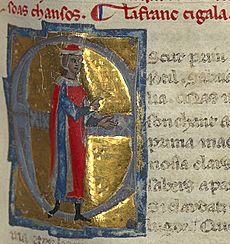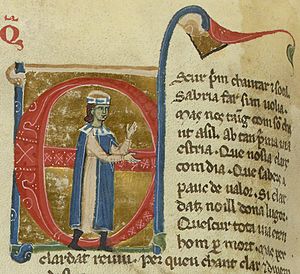Lanfranc Cigala facts for kids
Lanfranc Cigala (also spelled Cicala) was a famous poet and musician from Genoa, Italy. He lived in the 1200s, from about 1235 to 1257. Lanfranc was a nobleman, a knight, and even a judge. He is known as one of the most important troubadours from the Lombardy region of Italy.
Troubadours were poets and composers who wrote and performed songs, often about love, chivalry, and current events. Lanfranc wrote his poems in Occitan, a language spoken in parts of southern France and northern Italy.
Thirty-two of his poems still exist today. These poems cover many topics, including the Crusades (religious wars), different beliefs, the power of the Pope, the importance of peace among Christians, and loyalty in love. Lanfranc was part of a group of Italian troubadours who often spoke out against the Pope's decisions regarding the Crusades.
His collection of poems includes seven love songs (called cansos), four religious songs, three sirventes (poems that often criticized society or politics), two songs about the Crusades, and one planh (a lament or mourning song). He also wrote nine tensos, which are poetic debates with other troubadours. He debated with poets like Simon Doria, Jacme Grils, and Guilleuma de Rosers.
Contents
Lanfranc Cigala's Life Story
Lanfranc Cigala was first mentioned in official records in 1235 as a iudex, which means a judge. In 1241, he served as an ambassador for the Republic of Genoa. He traveled to the court of Raymond Berengar IV in Provence, a region in France. It was likely there that he met another troubadour named Bertran d'Alamanon.
In 1248, Lanfranc was in Ceuta, a city in North Africa, for a trading trip. The last time he was mentioned alive in a document was on March 16, 1257. Records show he had passed away by September 24, 1258. There was a story that he was killed in Monaco in 1278, but this is not true.
Poems About Faith and Crusades
Lanfranc was a complex thinker when it came to religion and war. He criticized the Pope's strategies for the Crusades. However, he also supported the Albigensian Crusade, which was a war against a group of people called Cathars in southern France.
In one of his poems, Si mos chans fos de joi ni de solatz, Lanfranc wrote to the Count of Provence. He suggested that the Holy Sepulchre (a sacred place in Jerusalem) would have been freed if Christian leaders had worked together. He believed that peace among Christian states was essential for any successful Crusade in the East.
This poem was written after Jerusalem was lost in 1244. Lanfranc did not directly blame the Emperor or the Pope. However, his words hinted that the Pope's policies might have been too focused on gaining power or wealth. Lanfranc strongly believed that Christians needed to find peace among themselves. He felt this was crucial for their religion to survive.
Among his religious songs, three were about the Virgin Mary. The most well-known of these is Gloriosa sainta Maria.
Poems About Love and Loyalty
Some of Lanfranc's love poems showed ideas that would later become part of a new style of poetry called dolce stil nuovo. For example, in his poem Quant en bon luec, he wrote that "love is born in loyal hearts." His poetry often praised women and stressed how important loyalty was in relationships.
In another poem, Lanfranc honored a countess from the House of Este who had passed away. He wrote that God wanted her to rule in heaven. He imagined that even if she was missed on Earth, angels would carry her to heaven singing.
Lanfranc wrote about several ladies in his poems. One was named Berlenda. Another was called de Villafranca, and Lanfranc enjoyed making clever wordplays on her name. This woman might have been Alasia, the daughter of Guglielmo Malaspina.
Lanfranc wrote only one planh, a sad song, for a lady named Luresana. He called her chan-plor, which means "sing-cry." This poem begins with the line Eu non chant ges per talan de chantar.
Later, in a collection of stories by Francesco da Barberino, there is a short biography of Lanfranc. It describes him struggling between his duties to guests and his devotion to a lady. This story shows how early writers began to explore inner feelings and conflicts.
Other Writings
Lanfranc also wrote a strong sirventes (a type of satirical poem) in July 1245. This poem, which starts Estier mon grat mi fan dir vilanatge, attacked Boniface II of Montferrat.
He also wrote a lighter poem called Escur prim chantar e sotil. In this work, he defended the trobar leu style of poetry. This style was known for being clear, simple, and easy to understand.
See also
 In Spanish: Lanfranc Cigala para niños
In Spanish: Lanfranc Cigala para niños



